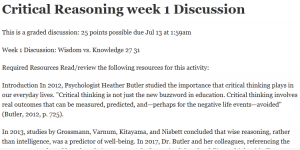Critical Reasoning week 1 Discussion

This is a graded discussion: 25 points possible due Jul 13 at 1:59am
Week 1 Discussion: Wisdom vs. Knowledge 27 31
Required Resources Read/review the following resources for this activity:
Introduction In 2012, Psychologist Heather Butler studied the importance that critical thinking plays in our everyday lives. “Critical thinking is not just the new buzzword in education. Critical thinking involves real outcomes that can be measured, predicted, and—perhaps for the negative life events—avoided” (Butler, 2012, p. 725).
In 2013, studies by Grossmann, Varnum, Kitayama, and Nisbett concluded that wise reasoning, rather than intelligence, was a predictor of well-being. In 2017, Dr. Butler and her colleagues, referencing the Grossmann study and based on their own research, determined that the ability to think critically was a better predictor of effective life decisions than was intelligence (Butler, Pentoney, & Bong, 2017).
Initial Post Instructions For the initial post, address the following:
Follow-Up Post Instructions Respond to at least two peers or one peer and the instructor. Further the dialogue by providing more information and clarification. Look at your peers’ definitions. Do you agree with them? If yes, why, if no, why not?
Textbook: Chapter 1, 2, 3 Lesson Minimum of 1 scholarly source (in addition to the textbook)
Do you agree that wisdom/critical thinking is a better predictor of well-being than intelligence? To answer, you will have to define what the following terms mean for you:
Reflect on what you read in the text this week. Think of the people you know.
Critical thinking Wisdom Intelligence Well-being
Are the good people smart? Are the smart people good? How do you define “good”? How do you define “smart”? Can we use our intelligence to become “good”? If yes, how? If no, why not?